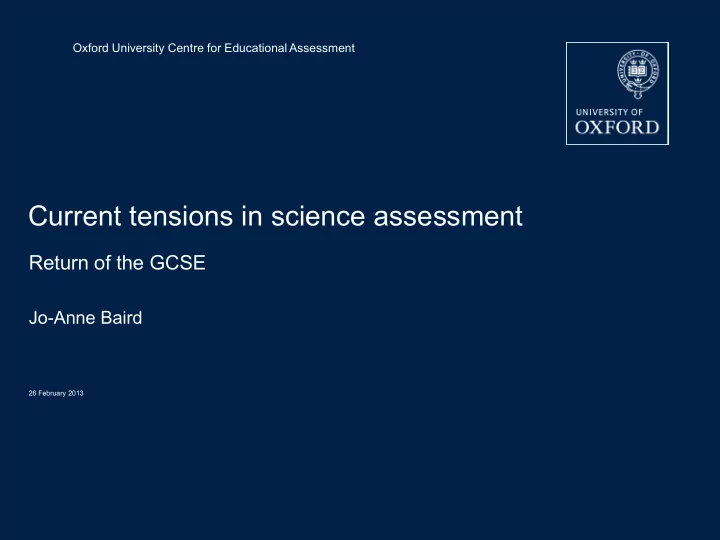

Oxford University Centre for Educational Assessment Current tensions in science assessment Return of the GCSE Jo-Anne Baird 26 February 2013
GCSE Reform proposals Raise the level of challenge End of course examinations Remove transparency No examination aids Increase motivation Controlled assessment restricted Remove tiering
Diagnosis Bite-sized chunks ‘ I believe that a blinkered Rote learning conceptualisation of curriculum, the Formulaic examinations strong trend towards fine-grained Teaching to the test prescription, atomised assessment, the accumulation of little ‘ credits ’ like grains of sand, and intensive coaching towards short-term objectives, are a long call from the production of truly integrated knowledge and skill. ’ Sadler (2007, p392) March 1, 2013 Page 3
Behaviourist theory of learning Learning is demonstrated in behaviour Mental processes are not important Study of animals tells us about human learning (eg rats & pigeons) Learning as a reaction to stimuli in the environment, such as teaching
Behaviourist approach to assessment Control conditions Measure memory for facts Compare performance with criteria or norms Global score for performance on ability in subject area Norm- or criterion-referenced
Cognitive-constructivist theory of learning Learning occurs in the brain Cognition, especially meta-cognition important Memorisation of facts not so impressive Building of mental models of the world Integrate and build upon previous knowledge and learning Novice-expert differences
Cognitive-constructivist assessments Higher order skills synthesis Evaluation Problem solving Extended tasks Assessed in terms of novice-expert continuum
Socio-cultural theory of learning Learning is a social event Learning is situated and context-dependent Learning is value-laden Assessment as a social construct
Socio-constructivist approach to assessment Holistic, qualitative feedback emphasised Authentic tasks important Groups as well as individuals assessed Self- and peer-assessment important Engagement with criteria
On two metaphors for learning and the dangers of choosing just one Sfard (1998)
Recommend
More recommend